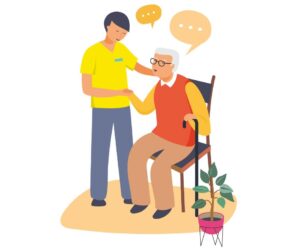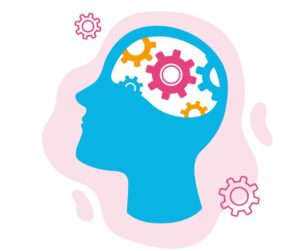Alzheimer's disease
What is Alzheimer’s disease?
Alzheimer’s disease is a physical disease that affects the brain. It is named after Alois Alzheimer, the doctor who first described it. The brain is made up of billions of nerve cells that connect to each other. In Alzheimer’s disease, connections between these cells are lost. This is because proteins build up and form abnormal structures called ‘plaques’ and ‘tangles’. Eventually nerve cells die and brain tissue is lost.

What are the symptoms?
Alzheimer’s is a progressive disease. This means that gradually, over time, more parts of the brain are damaged. As this happens, more symptoms develop, and they get worse. There are some common symptoms of Alzheimer’s disease, but no one’s experience will be exactly the same as anyone else’s.
For most people, the first signs of Alzheimer’s are problems with their memory – in particular, difficulties recalling recent events and learning new information. This is because early on in Alzheimer’s the damage is usually to a part of the brain called the hippocampus. This is where our memories are stored. However, the person’s memory for events that happened a long time ago is not usually affected in the early stages.

As well as memory difficulties, people with Alzheimer’s are also likely to have – or go on to develop – other problems. These include problems with thinking, reasoning, language or perception such as:
- speech – they may repeat themselves or struggle to follow a conversation
- seeing things in three dimensions and judging distances (visuospatial skills)
- concentrating, planning or organising – they may struggle with making decisions, solving problems or carrying out a sequence of tasks (such as dressing)
- orientation – they may become confused or lose track of the day or date
- navigation – finding their way may become more difficult
As Alzheimer’s progresses, problems with memory loss, language, reasoning and orientation get much worse. Many people with Alzheimer’s also start to behave in ways that aren’t normal for them. These might include being very restless or pacing up and down, calling out, repeating the same question, having disturbed sleep patterns or reacting aggressively.
What are the symptoms in the later stages of Alzheimer’s disease?
In the later stages of Alzheimer’s disease someone will become much less aware of what is happening around them. They may have difficulties eating or walking without help and become increasingly frail with a high risk of falls. Eventually, the person will often need full support with all of their daily activities.
Our approach to dementia care at Four Seasons Health Care Group
Get in touch
If you have any questions about our care or services, please get in touch below.
Please note that we cannot respond to queries about application process, or current vacant positions. Please visit our careers website for information about working with us or current vacancies.

